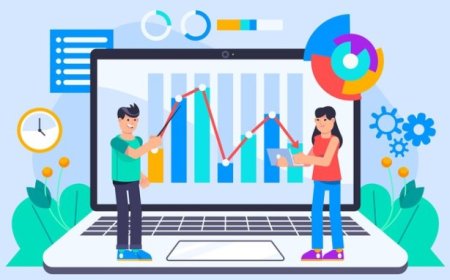The Importance of Data Science
Explore the crucial role of data science in decision-making, innovation, and predicting trends across industries and the power of data science

Data science is a field that mixes computer science with statistics to find meaningful insights from data. This field plays a crucial role in helping businesses make informed decisions, improve their services, and solve complex problems. By analyzing large sets of data, data scientists can uncover trends, predict future events, and provide solutions that benefit both companies and their customers. As our world becomes more data-driven, the importance of data science continues to grow, shaping the way we understand and interact with the world around us. This blog will explore how data science impacts various aspects of our lives and why it's becoming an essential part of many industries.
Data science involves analyzing large amounts of data to extract valuable insights and make informed decisions. Its role is to turn raw data into actionable information that can drive business strategies, improve processes, and solve complex problems.
Key components of data science include:
-
Data Analysis: Examining data for patterns and correlations using statistical techniques and visualization tools.
-
Machine Learning: Algorithms that allow computers to learn from data and make predictions without explicit programming, used in various applications like recommendation systems and fraud detection.
-
Predictive Modeling: Building mathematical models to forecast future outcomes based on historical data, used for sales forecasting and understanding customer behavior.
These components help organizations extract insights from data, driving innovation and informed decision-making.
1. Driving Innovation and Decision-Making
Data science drives innovation by offering insights for strategic decision-making. In healthcare, data analysis identifies disease patterns, improving treatment outcomes. In finance, predictive modeling assesses risks and detects fraud, ensuring financial stability.
Case studies demonstrate how data-driven insights impact decision-making:
-
Retail: Data analysis optimizes product offerings, boosting sales and customer satisfaction.
-
Manufacturing: Predictive maintenance prevents equipment failures, enhancing efficiency and cutting costs.
-
Travel: Machine learning suggests personalized travel experiences, improving satisfaction and loyalty.
These examples illustrate how data science drives innovation and enables informed decisions, leading to competitive advantages and business success. By leveraging data-driven insights, companies anticipate trends, manage risks, and seize opportunities for continuous growth.
2. Empowering Businesses and Organizations:
Data science enhances operational efficiency, productivity, and profitability for businesses across various sectors. By analyzing data, organizations gain insights that optimize processes and drive growth. Data science helps businesses in three key areas:
-
Marketing: By understanding customer preferences and behavior through data analysis, businesses can create targeted advertising campaigns. This leads to more sales and higher conversion rates.
-
Customer Relationship Management (CRM): Data science enables businesses to personalize interactions with customers, anticipate their needs, and provide better service. This results in happier customers who are more likely to come back and buy again.
-
Risk Management: By analyzing past data and market trends, businesses can identify potential risks and take action to minimize them. This helps maintain financial stability and reduces losses.
3. Enhancing Customer Experiences through Personalization:
Businesses are using data science to personalize customer experiences, making interactions more tailored to individual needs. By understanding customer preferences and behaviors, companies can offer products and services that match what each customer wants. This makes customers feel valued and understood, leading to happier customers who are more likely to stay loyal.
4. Revolutionizing Healthcare with Predictive Analytics:
Healthcare is being transformed by predictive analytics, which uses data to predict health outcomes and personalize treatment plans. By analyzing data from patient records and medical tests, doctors can identify health risks early and provide targeted interventions. This helps improve patient health and reduces healthcare costs by preventing costly complications and hospital visits.
5. Improving Governance and Public Policy
Data science is helping governments make better decisions by providing insights into societal needs and trends. By analyzing data on things like population demographics and public services, governments can allocate resources more effectively and create policies that better serve citizens. This leads to more efficient governance and better outcomes for everyone.
6. Solving Complex Problems
-
Predictive Modeling for Forecasting Trends: Predictive modeling looks at past data to predict future trends. By studying patterns in the data, it helps anticipate changes in things like sales, finances, or even weather. This helps businesses plan ahead, foresee market changes, and manage resources wisely.
-
Detecting Patterns and Anomalies: Data science finds patterns and oddities in large sets of data. It helps organizations identify unusual behaviors, which could be problems or opportunities. For example, in cyber security, it catches suspicious activities like hacking. In manufacturing, it spots issues like inefficiencies or defects in production.
-
Optimizing Processes and Resource Allocation: Data science helps businesses work smarter. By looking at data and using math, companies can make things run smoother and use resources better. This saves money, boosts productivity, and makes the most of what they have, leading to success.
Ethical Considerations and Challenges
-
Privacy Concerns and Data Protection: Protecting people's privacy and their data is crucial. It's about making sure that personal information is kept safe and used responsibly. This means companies need to be careful about how they collect, store, and share data to respect individuals' rights and protect them from harm.
-
Bias and Fairness in Algorithms: Algorithms, which are sets of rules used by computers to make decisions, can sometimes be unfair or biased. This happens when they favor certain groups of people over others, leading to unfair outcomes. It's important to check algorithms for bias and make sure they treat everyone fairly, regardless of factors like race, gender, or background.
-
Ensuring Transparency and Accountability: Being transparent means being open and clear about what data is collected and how it's used. Accountability means taking responsibility for actions and decisions. In data science, it's essential for organizations to be transparent about their data practices and accountable for any consequences. This builds trust with customers and helps ensure ethical behavior.
Career Opportunities in Data Science
-
Exploring Different Jobs: In data science, you can find various roles like data analyst, engineer, or scientist. Each job focuses on different aspects of working with data, giving you options based on your interests.
-
Skills and Qualifications Needed: To work in data science, you need to be good at programming, especially in languages like Python or R. You should also be good at solving problems and understanding data. While a bachelor's degree in fields like computer science or math is helpful, having extra education like a master's degree can make you more competitive.
-
Future of Data Science: Data science is growing fast, especially with new technology like artificial intelligence. More businesses are using data, so there's a lot of demand for people who can work with it. This means there are good job opportunities now and in the future for people with data skills.
Case Studies and Success Stories
-
Real-World Examples of Data Science Applications:
Data science helps stores predict what products customers will buy, doctors make personalized treatment plans, and banks catch fraud. These examples show how data science is used in everyday life to solve problems and make things better.
-
Impactful Projects and Their Outcomes:
Analyzing customer data helped a store sell more products, while studying traffic data helped a city reduce traffic jams. These projects show how data science can solve problems and make life easier for everyone.
Data science is crucial for understanding trends, solving problems, and making better decisions across various industries. It enables businesses to thrive, improves healthcare outcomes, and enhances governance and public policies. The future of data science looks promising. With advancements like AI and machine learning, we can expect more progress in fields like healthcare and finance. By using data responsibly, we can tackle challenges and create a better future.
Individual and organizations need to adopt data-driven approaches. By using data well, we can find valuable insights, drive innovation, and stay competitive.





































